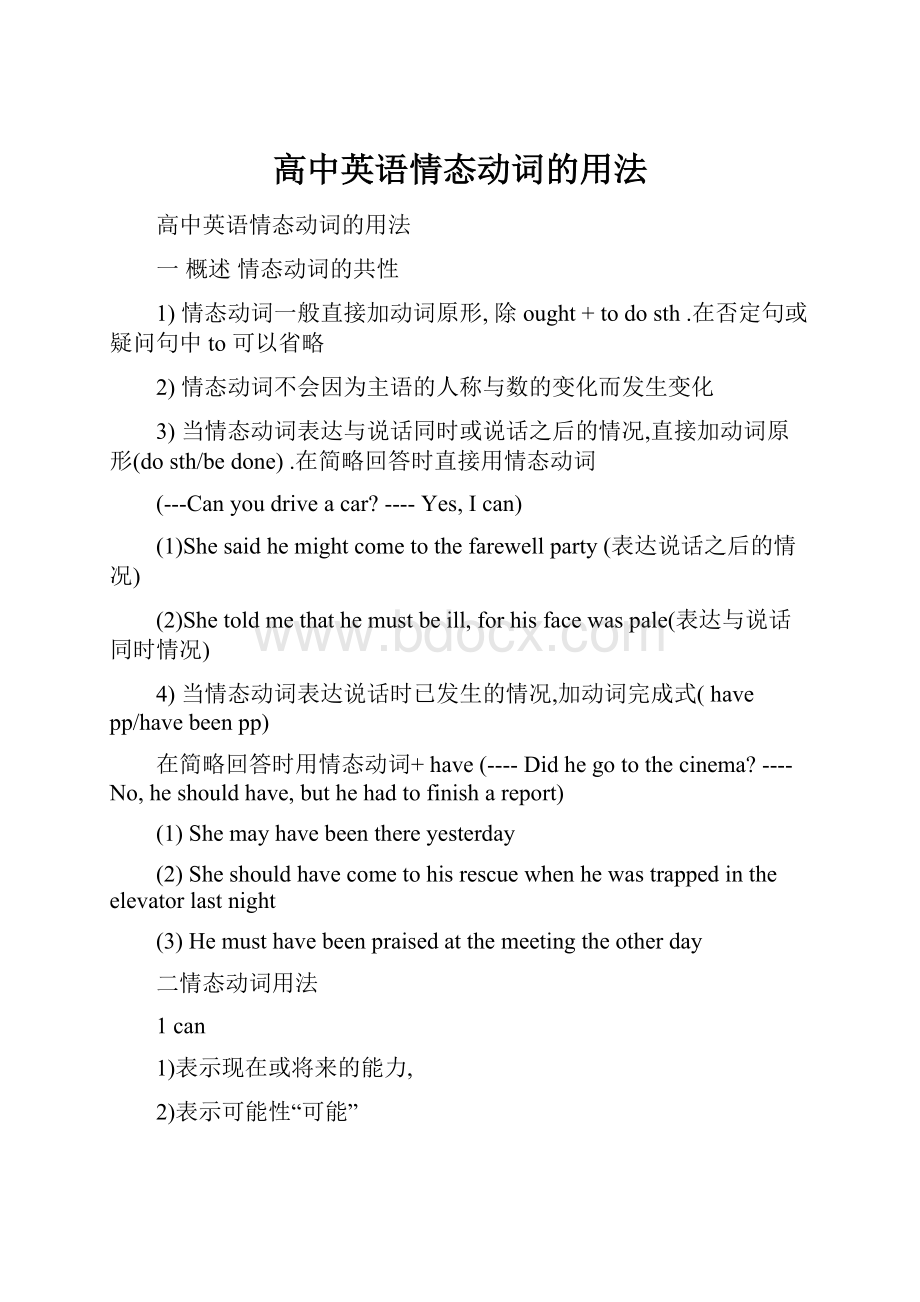高中英语情态动词的用法.docx
《高中英语情态动词的用法.docx》由会员分享,可在线阅读,更多相关《高中英语情态动词的用法.docx(27页珍藏版)》请在冰豆网上搜索。

高中英语情态动词的用法
高中英语情态动词的用法
一概述情态动词的共性
1)情态动词一般直接加动词原形,除ought+todosth.在否定句或疑问句中to可以省略
2)情态动词不会因为主语的人称与数的变化而发生变化
3)当情态动词表达与说话同时或说话之后的情况,直接加动词原形(dosth/bedone).在简略回答时直接用情态动词
(---Canyoudriveacar?
----Yes,Ican)
(1)Shesaidhemightcometothefarewellparty(表达说话之后的情况)
(2)Shetoldmethathemustbeill,forhisfacewaspale(表达与说话同时情况)
4)当情态动词表达说话时已发生的情况,加动词完成式(havepp/havebeenpp)
在简略回答时用情态动词+have(----Didhegotothecinema?
----No,heshouldhave,buthehadtofinishareport)
(1)Shemayhavebeenthereyesterday
(2)Sheshouldhavecometohisrescuewhenhewastrappedintheelevatorlastnight
(3)Hemusthavebeenpraisedatthemeetingtheotherday
二情态动词用法
1can
1)表示现在或将来的能力,
2)表示可能性“可能”
(1)在肯定句中指逻辑推理的可能性,不指具体的事情的可能性,即泛指的可能性但在否定句或疑问句中可以表达具
体一件事情的可能性A:
DrivingcarelesslycanbedangerousB:
ToomuchstresscandriveapersonmadC:
EverybodycanmakemistakesinhislifeD:
Therebeingtoomuchsnowonahighwaycanleadtoaccidents
(2)在否定句中表示“不可能”A:
Hecan?
tbehungryB:
Shecan?
thavebeencriticizedatlastweek?
smeeting
C:
Shecan?
tpossiblybetired
(3)在疑问句中表示“可能吗,”A:
CanshehavebeentothescenicspotlastFriday?
(4)S+canhave(been)+
pp表示“可能已发生某事”,一般用在否定句或疑问句,如:
CanshehavebeentothescenicspotlastFriday?
(5)在肯定句中还可以表示“有时可能”A:
ScotlandcanbeverycoldinwinterB:
Heisabad-temperedguy,buthecanbequitecharmingwhenhewishesC:
Youcanbeveryannoying
总之can表示可能性“可能”时可以用在肯定句、否定句和疑问句中。
3)表示“允许”,相当于may,can?
t表示“不可以,不能”
(1)Youcanparkhere
(2)Hecan?
ttakethemagazineoutofthelibrary
4)表示“可以”,在疑问句中主语常是第一人称或第三人称如:
(1)CanIwatchTVafterIhavefinishedmyjob?
(2)Canhedomeafavorbyopeningthedoor?
2could
1)表示过去的能力
(1)IcouldclimbanytreewhenIwasyoung
(2)IgotupearlysothatIcouldcatch
theearlybus
2)表示过去的可能性
(1)Hecouldbeverynaughtywhenhewasaboy
(2)Shesaidthathecouldn?
tbehungry(3)
Shetoldmethathecouldn?
thavelefthere
3)有时could可以代替can表示现在或将来的情况
(1)Could(=Can)yousendmeanapplicationform?
(表示“委婉提出请
求”)
(2)Couldthisbetrue?
(表示“可能”)(3)----Whoistheman?
----Hecould/may/might/beourprincipal(表示“可
能”)注意:
在肯定句中一般不用can表示具体的某一件事情的可能性,但可以用could在肯定句中表示具体的某一件
事情的可能性)
4)canhavepp与couldhavepp的区别
A:
canhavepp一般只能表示可能已发生了某事,用在否定句或疑问句中,一般不用在肯定句中且不表达虚拟语气B:
couldhavepp既可以表示可能已发生了某事,等于canhavepp,也可以表达虚拟语气“本来能够做某事但实际未做”注
1
意:
当主句的谓语动词是过去式时,那么从句在表示可能已发生了某事时,只能用couldhavepp如:
Hesaidthatshe
couldn?
thavecommittedsuicide
3may
1)表达“可以”在疑问句中主语常用“I”
(1)MayIhaveyourattention,please?
(2)MayIhaveyourname?
(3)YoumaywatchTVafteryouhavefinishedyourhomework(4)Youmaycomeifyouwish(5)Dogsmaynotbe
takenintothehouses
2)在肯定句表示“可能”,常指根据具体的已知的信息,表达具体的某一件事情的可能性。
如果表示说话同时或之后
的情况用maydosth;如果表示说话时已发生的情况用mayhave(been)pp;如果表示说话时正在发生的情况用maybe
+doing;如果表示过去某一具体的时间正在发生的情况用mayhavebeendoing在否定句中表示“可能不”,在表示
“可能”时,一般不用在疑问句中
(1)Hisfaceispale;hemaybeill
(2)---Whoisthemanspeakingtoourfather?
----Hemaybeournewheadmaster(3)Hisroomisdark;hemayhavegoneoutforadrive/walk/swim/rest(4)---Whereisthegeneralmanager?
---Hemayhaveseenthedoctor,forhehascaughtabadcold(5)HemayhavebeenwatchingTVatninelastnight(6)Shemaybecommentingonthenewlyreleasedfilmnow3)may在sothat/inorderthat+目的状语从句中表达“可以”如:
Heworkshardinorderthathemaybeadmittedtothatfamouscollege
4)may在让步状语从句中表达“可能”
(1)Nomatterwhatyoumayhavedone,Ihavenointerest(“mayhavedone”
从句谓语动词所表示的时间明显在主句所表示的时间之前)
(2)Whoeveryoumaybe,hewon?
tletyouin(“maybe”从
句谓语动词所表示的时间与主句所表示的时间同时)(3)动词原型+what+S+may,+主句A:
Costwhatthebook
may,I?
lltakeit(不管这书花多少钱,我都买)B:
Comewhatmay,I?
lltakethesideofyou(不管发生什么事,
我都支持你)
5)may在祝愿语中的用法,May+主语+动词原型!
(1)Mayyousucceed!
(=Wishyousuccess)
(2)Mayallofyoubehappy!
(=Wishallofyouhappiness!
)
6)may在常用句型中的用法,
(1)S+maywelldosth(很可能)如:
Shemaywelldropinforsometeaonherway
towork
(2)S+may/mightaswelldosth(不妨做某事,表示与说话同时或之后的情况)如:
Wemayaswellstayat
homewatchingTVtonight(3)S+may/mightaswellhavepp(不妨做某事,表示说话时已发生的情况)如:
Youmay
aswellhavegoneonanoutinglastweek,butyoujuststayedathomedoingnothing(4)Iwishtodosth,mayI?
4might
may的过去式,一般表示过去的情况
1)“可以”
(1)IaskedtheactingmanagerifImightgohomehalfanhourearliertoday
(2)Heaskedmeifhemightusethephone
2)“可能,也许”
(1)Hesaidthathemightbelatewiththesupper
(2)Iguessedhemightcometomorrow(注
意:
在以上的句中都不能用may代替might,因为当主句的动词是过去式时,从句中的情态动词也用过去式)(3)He
might/may/couldbeournewEnglishteacher(4)Shemight/may/couldbewatchingtheclosefootballmatch(5)Tommight/mayhavefinishedthedemandingtask(6)----Canhehavelefthisbaginthelibrary?
------Yes,hemight/mayhave(注意:
这里的have不能省略)
3)有时might代替may表示现在的情况,语气更婉转或可能性更小
(1)MightIuseyourphone?
(2)He
might/may/couldtellhiswifethenewswhenhegetstothedestination(3)Hemight/may/couldbedependingonyoutogivehimahelpinghand
4)mayhavepp与mighthavepp的区别
(1)mayhavepp表示“可能”一般只用在肯定句“可能”或否定句中“可能不”
而不表示虚拟语气
(2)mighthavepp既可以表示“可能”也可以表示虚拟语气“过去本来可以做但实际未做”注意:
主句
的谓语是过去式时,从句中只能用mighthavepp表示“可能”
5must
1)表示必然性“一定”
2
(1)Allofusmustdie
2)表示“必须,一定要,得”
(1)Youmustcutdownonsmoking
(2)Imustremembertogotothebanktoday(3)I?
mafraidImustbegoing
3)表示“义务”
(1)Parentsmustsendtheirchildrentoschool
4)在肯定句中代替need表示“有必要”
(1)---NeedIfinishtheexercisesbeforeIwatchTV?
-----Yes,youmust/No,youneedn?
t
(2)Youmustgetupearlytomorrowmorning
5)mustn’t表示“不得,禁止,一定不要”
(1)Youmustn?
ttakephotoshere
(2)Wemustn?
tbelateforthemeeting
6)表示“偏偏”
(1)WhenIwasbusycooking,thetelephonemustring
(2)Whenhewasabouttogotowork,anunexpectedvisitormustcometoseehim(3)Whymustyoubuysuchanexpensivedresswhenyouareshort
ofmoney?
7)表示推测“一定”,只能用在肯定句中。
A:
表示对现在的情况推测mustbe+adj./n/adv.
(1)Hemustbehungrynow
(2)Judgingfromhisaccent,hemustbefromBeijing;
B:
mustbedoing表示对现在或将来正在进行的情况推测
(1)HemustbedeliveringaspeechthistimetomorrowC:
musthave(been)pp表示对已发生的情况推测
(1)HemusthavebeeninBeijinglastweek
(2)Shemusthavebeencriticizedatlastnight?
meeting;
D:
musthavebeen+doing表示对过去某一具体的时刻正在发生的情况推测
(1)Youmusthavebeenplayingbasketballatfouryesterdayafternoon
6mustmay与can在表示推测时的用法上的区别
1)can可以用在肯定句“可能”,否定句“不可能”或疑问句“可能吗?
”
2)may可以用在肯定句“可能”,否定句“可能不”,不用在疑问句
3)must只能用在肯定句中“一定”
4)在肯定句中can与may都表示“可能”,但有区别
(1)can在肯定句中指逻辑推理的可能性,不指具体的事情的可能性,即泛指的可能性
(2)can在肯定句中还可以表示“有时可能”
(3)may在肯定句表示“可能”,常指根据具体的已知的信息,表达具体的某一件事情的可能性。
7will
1)助动词,帮助构成将来式
(1)willdosth(一般将来式)
(2)willbedoingsth(将来进行式)(3)willhavedonesth(将来完成式)
2)表示“请求”,用在疑问句中且主语常是you
(1)Willyoupleasesitdown?
(2)Openthedoor,willyou?
3)表示“愿意”
(1)Iwillgiveyoualifttotheairport
(2)Ifyouwillgotothecinemawithme,I?
llappreciate
it
4)表示“现在习惯性动作与行为”
(1)Eachtimehecomeshere,hewillsitforhourstalkingaboutalmosteverything
(2)OnSundaysshewillcallonherteacher
5)表示“客观规律”
(1)Oilwillfloatonwater
(2)Hewillbetwentyyearsoldnextyear6)表示“决心,坚持,承诺”
(1)---Tellhimthenewswhenyoumeethim-----Iwill(承诺)
(2)----Don?
tforget
toposttheletter---Iwon?
t(承诺)(3)Hewillhavehisway(坚持)(4)Iwon?
tletyoudowninanyway(决
心)
8would
1)助动词
woulddosth过去将来式Shesaidthatherfatherwouldcometoseeher
3
2)would代替will表示现在或将来的情况,语气更婉转客气
(1)WouldyouhelpmewithmyEnglish?
(2)Iwould/should
like/lovetopayavisittotheBeijing-basedcompany(3)Iwouldratherstayathomethangoonapicnictomorrow
3)表示过去习惯性动作与行为
(1)Hewouldchatwithmewhenhestayedwithme
(2)Whenhewasatcollege,
hewouldcallonme
4)表示过去的意愿,常用在间接引语
(1)HeaskedmeifIwouldhelphimwithhisEnglish9should
1)shoulddosth表示“应该”表示与说话同时或之后的情况
(1)HetoldmeIshoulddropinonmyformerEnglishteacher
thenextday
(2)Weshouldhelpeachotheratschool(3)Sheshouldgivemearingwhenshegetstoherdestinationtomorrow
2)shouldhavedonesth表示“过去本来应该做某事但实际未做”等于oughttohavedonesth;shouldnothavedonesth“过去本来不应该做某事而做了”等于oughtnottohavedonesth
(1)Youshouldhavepostedtheletteronyourwayhomeyesterday
(2)Sheshouldn?
thavebeencriticizedinthepresenceofa
largeaudienceatlastweek?
smeeting
3)should在状语从句中的用法
(1)incase+从句(万一)如:
You?
dbettertakeanumbrellaincaseitshouldrain(虚拟语气)/itrains(陈
述语气)
(2)forfearthat+从句(惟恐)(3)lest+从句(以免)
10shall
1)助动词如果主语是I/we且句子是陈述句,那么可以用shall代替will表示将来式
2)当主语是第二或三人称时且句子是陈述句,那么shall表示“许诺”,“命令”“威胁”,“强制”等
(1)Ithasbeenannouncedthatcandidatesshallremainintheirseatsuntilallthepapershavebeencollected.
(2)YoushallhavethebookwhenIfinishreadingittomorrow
3)当主语是第一或三人称时且句子是疑问句,那么shall表示征询对方的意见“好吗,”等
(1)WhatshallIdosupposingthetrainisbehindtime?
(2)Shallheopenthewindowforyou?
(3)Let?
sgiveaperformancetogetheratthecomingfarewell
party,shallwe?
11ought
ought+todosth.
1)oughttodosth表示“应该”表示与说话同时或之后的情况
(1)HetoldmeIoughttodropinonmyformerEnglishteacherthenextday
(2)Weoughttohelpeachotheratschool
(3)Sheoughttogivemearingwhenshegetstoherdestinationtomorrow
2)oughttohavedonesth表示“过去本来应该做某事但实际未做”等于shouldhavedonesth
或oughtnottohavedonesth“过去本来不应该做某事而做了”就等于shouldnothavedonesth
(1)Youshouldhavepostedtheletteronyourwayhomeyesterday
(2)Sheshouldn?
thavebeencriticizedinthepresenceofa
largeaudienceatlastweek?
smeeting
注意:
ought一般不用在虚拟语气中
12need
既可以作情态动词也可以作行为动词或名词
1)名词
(1)theneedforsth:
Theneedforfreshwaterisincreasinglylarge;
Thiswillaffectthebody?
s